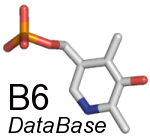|
|
| type |
Journal Article |
| authors |
Trakatellis, A.; Dimitriadou, A.; Trakatelli, M. |
| title |
Pyridoxine deficiency: new approaches in immunosuppression and chemotherapy |
| journal |
Postgrad Med J |
| Activity |
2.1.2.1 |
| ui |
98159404 |
| year |
(1997) |
| volume |
73 |
| number |
864 |
| pages |
617-22. |
| | |
|---|
| keywords |
Animal |
| abstract |
Pyridoxine deficiency leads to impairment of immune responses. It appears that the basic derangement is the decreased rate of production of one-carbon units necessary for the synthesis of nucleic acids. The key factor is a pyridoxine enzyme, serine hydroxymethyltransferase. This enzyme is very low in resting lymphocytes but increases significantly under the influence of antigenic or mitogenic stimuli, thus supplying the increased demand for nucleic acid synthesis during an immune response. Serine hydroxymethyltransferase activity is depressed by deoxypyridoxine, a potent antagonist of pyridoxal phosphate, and also by known immunosuppressive or antiproliferative agents. The combination of these agents is additive. Our results lead us to suggest the following medical applications: (a) combination of deoxypyridoxine with immunosuppressive or chemotherapeutic drugs may be effective in cases of immunosuppressive therapy or organ transplantation, (b) the development of special agents directed against the serine hydroxymethyltransferase apoprotein may prove to be a valuable medical tool, since this enzyme presents an excellent target for chemotherapy, (c) lymphocytes of individual patients could be used to design tailor-made specific immunosuppressive or chemotherapeutic treatment, and (d) the serine hydroxymethyltransferase activity of lymphocyte culture presents an excellent indicator for the evaluation of potency of immunosuppressive, chemotherapeutic or genotoxic compounds in a simple and rapid test. |
| last changed |
2002/11/04 17:41 |
|











